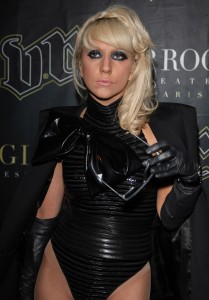
By Chris Nguyen
Features Editor
Lady Gaga
The Fame Monster
Interscope Records
Lady Gaga, I surrender. As I continued to put up my wall against Lady Gaga since the release of her number one hit “Just Dance,” she continued to release single after single that were virtually impossible to avoid and eroded my hatred and annoyance.
Yes, she is materialistic, self-important, ostentatious, vulgar, obvious, derivative and much much more. But those are the exact qualities that make good pop music—just ask Madonna, to which Lady Gaga has been lazily compared. Nonetheless, the comparison does have apt similarities because, like Madonna, she acts as a pop entertainer, not singer, with a knowing and ironic wink at her outrageous music videos, outfits and comments.
It is a persona that Lady Gaga has perfected with The Fame Monster, which is being released as bonus CD to her massively successful The Fame and a stand alone EP. On it, she blatantly repeats pop styles (including her own) without any regret.
There’s “Vogue”-era Madonna in “Dance in the Dark,” with the roll call of names, but instead of glamorous movie stars, Lady Gaga remembers the more idiosyncratic and tragic (Marilyn/Judy/Sylvia/Tell him how you feel girls/Ramsey /Lamont/White/Liberace). And then there is the ‘80s New Wave influence that undercuts the entire album, like the eeire electronic synths of “Monster.”
What makes the album something more than tribute to the past is the coy insight Lady Gaga finally makes about love.
On album highlight “Bad Romance,” which smartly reworks the sound producer RedOne made on “Poker Face,” Lady Gaga moves away from her juvenile desire for a “disco stick” to espousing the complications that accompany relationships (I want your loving and/I want your revenge/You and me could write a bad romance). Throughout the album, she rejects the tangles and complications of love, such as on “So Happy I Could Die,” in which she finds happiness in herself and on the Beyonce-collaborated “Telephone,” in which she leave her boyfriend hanging to dance her heart out.
Lady Gaga proves she can write lyrics that are catchy and have depth, even if there is the occasional misstep, like “Speechless.” A song dedicated to her then-ailing father, it falls flat under the suffocating Beatles-lite rock melody and lyrics that land on the side of saccharine.
Yet, as enjoyable as the album is with its nonstop melodies and hooks, it does not have enough substance or true innovation to make it as a long-lasting pop album and only fulfills its sole job as taste-quencher to the fans between albums.
Of course, there was no way of knowing that Madonna’s “Into the Groove” would still be a pop staple or that the technically more talented Cyndi Lauper would fade as Madonna rose to pop stardom. It is the fickle nature of pop music. All Lady Gaga can do is make adrenaline-inducing music while we surrender and “just dance.”








